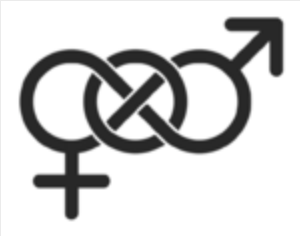
Like, why get all wound up?
Faced with the problems associated with socio-sexual identities, testicular reassembly using tools such as Andro-switch, the underpants, etc., can facilitate an emancipatory approach to family relationships in terms of contraceptive choices and one's position in the face of patriarchy and viriarchy.
Gender is a concept used not only in biology and sociology, but also in mathematics, physics, linguistics and the arts. Men" and "women" are two categories of sex, while the concepts "masculine" and "feminine" correspond to categories of "gender". Aspects of sex or sexual characteristics don't change much from one human society to another, while aspects or characteristics of "gender" vary greatly.
Sexual identity refers to identification, or non-identification, with a specific sexual orientation.
Transgender is a type of gender identity that concerns people whose psychic sexual identity does not correspond to their biological sex. Cisgender is a type of gender identity in which a person's felt gender corresponds to their biological sex, assigned at birth...
Transqueers, cross-dressers, drag kings, butches, ...all people who refuse the social imposition of gender binarity, Yels (= neither they nor they, = one person) who claim the gender continuum....
How can I find my place? Do I have to belong to a category, an identity?
Simple, whoever you are, tackle these issues with a cross-disciplinary approach and a QUEER perspective.
Queer or alter- (or allo-) sexuality are terms reappropriated by LGBTI communities as a symbol ofself-determination and liberation. They refer to any idea, practice, person or identity that runs counter to the norms structuring the heteronormative social model. They encompass all genders and sexual orientations that allow us to recognize a difference, without having to define it rigidly, by giving it fluidity.
Well beyond the binary approach, remember that above all you are a human being.
Gender(s) & Contraception(s)
Questioning contraception today means, among other things, questioning representations of procreative autonomy and equity between human beings.
The material and legal accessibility of fertility control methods and knowledge has altered the balance of power in various social spheres. Whether through birth control or the (il)legitimacy of contraception, the political stakes involved in gender(s) and contraception(s) are complex and manifold at all levels, from the private to the collective.
Campaigning for reproductive autonomy and against the power relations surrounding contraceptive choices, for example through local mobilizations in favor of free contraception and abortion, or providing access to male contraception, are issues of equity between human beings.
Like, get it up for...
- Becoming an agent of change in gender relations.
- Deconstruct the hegemonic masculinity of compulsory masculinity, androcentrism and traditional masculinities.
- Be responsible and autonomous, not as a guinea pig, but as a conscious user of testicular upwelling and male thermal contraception as a possible alternative to masculine archetypes.
- Living collaboratively with others and with ourselves.
- Or for reasons of your own.
Self-determination, become human again!
Some reference texts from the LGBTI movement:
"Lesbiennes et pédés arrêtons de raser les murs" (Lesbians and fags, let's stop razing the walls) is how Rapport contre la normalité (Report against normality) begins, a collection of texts written by the legendary Front Homosexuel d'Action Révolutionnaire (Homosexual Revolutionary Action Front) and published in 1971, shortly after the group's creation. A mix of lexicon, manifesto, testimonials, short essays and magnificent punchlines: "Down with the fric society of hetero-cops!"
- Gender Trouble, Judith Butler, 1990
As famous as it is difficult to read, this essay by Judith Butler (then aged 34) is considered one of the founding texts of queer theory, and made this lesbian and Jewish American philosopher a key figure of her time. Inspired in particular by the figure of the drag queen, Butler develops the concepts of performance and, above all, the performativity of gender - the idea that gender is an unoriginal copy that each of us performs and perpetuates in spite of ourselves.
Distributed by four Act Up activists at New York Pride in 1990, this declaration of war on heterosexual society, written in the wake of an upsurge in homophobic violence and in the midst of the AIDS crisis, is considered a turning point in the queer movement - and is arguably one of the most beautiful and powerful manifestos ever. "How to tell you, how to convince you, brother, sister, that your life is in danger". It's impossible, even 30 years after its publication, to read it without getting teary-eyed.
- Epistemology of the closet, Eve Kosofsky Sedgwick, 1990
Often considered, along with Trouble dans le genre, as one of the founding texts of queer theory, Eve Kosofsky Sedgwick's classic tackles turn-of-the-20th-century Western literature (notably Wilde, Nietzsche and Proust), tracing the emergence of the legal, medical and pathologizing discourses that helped fabricate the figure of the "homosexual", the better to deconstruct them.
Act Up, une histoire, Didier Lestrade, 2000
In this memoir, renowned Act Up-Paris co-founder Didier Lestrade recounts the creation of the AIDS organization and its first ten years of existence. An essential account to better understand this period and Act Up's tactics in this most critical context.
Queer Zones, Sam Bourcier, 2001-2011
An iconoclastic researcher, Sam Bourcier was one of the first to introduce queer theory to France, notably with the first volume of Queer Zones, published in 2001. The queer theorist popularizes the writings of Judith Butler (from whom he would later distance himself), disserts on SM, pays homage to post-porn and Bruce LaBruce, and very seriously suggests that Deleuze should be fucked... quite simply.
La transidentité : De l'espace médiatique à l'espace public, Karine Espineira, 2008
One of the few trans researchers in France to work on these issues, media sociologist Karine Espineira, co-founder of the Observatoire des transidentités, has penned one of the equally rare works dedicated to media (and more specifically TV) treatment of trans issues.
Here's a list of associations and information on the subject that you can consult: